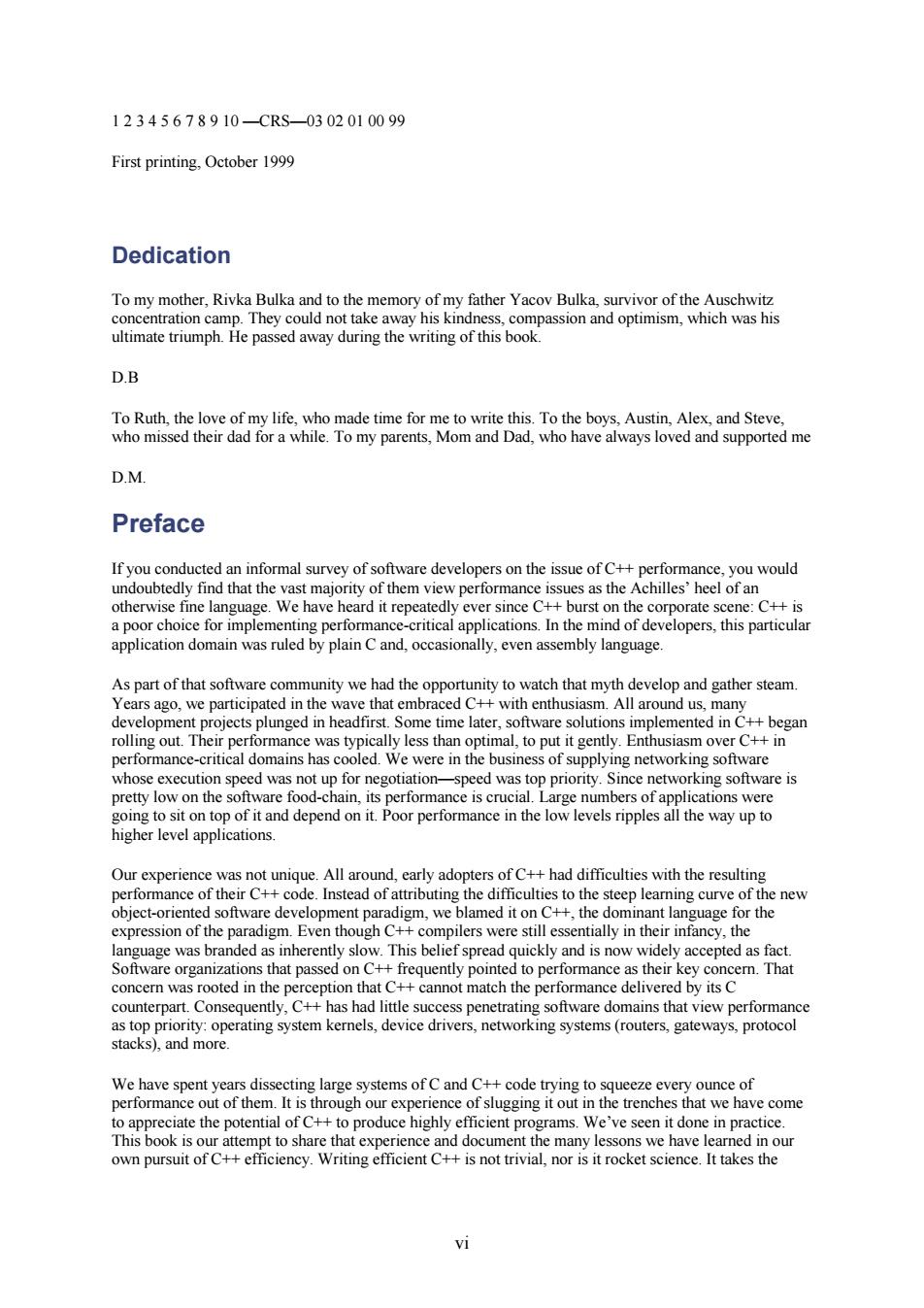正在加载图片...

12345678910CRS0302010099 First printing.October 1999 Dedication To my mother,Rivka Bulka and to the memory of my father Yacov Bulka,survivor of the Auschwitz and.which was his D.B D.M Preface If you conducted an informal survey of software developers on the issue ofC++performance,you would undoubtedly find that the apoorcocanguag application domain was ruled by plain C and occasionally even assembly language ad the development projects plunged in headfirst.Some time later,software solutions implemented in C++began ng out.In h tmal,to put it gently.E speed was not up for negotiation speed was top priority.Since networking sofware is pretty low on the so hain. he loge nu ers of applicatior ns we y up t higher level applications. was not unique .All around early adopters ofC++had difficultie s with the resulting nt pa igm.we blamed it on Cthe dominant efor the expression of the paradigm. Even ompilers were still ess tially in th r infancy L:L con cern was s rooted in the perception that C++ cannot match the performance delivered by its C nas ha m s de grams.We've seen it done in practice empt to sha exp e many wn purs nt docu vi 1 2 3 4 5 6 7 8 9 10 —CRS—03 02 01 00 99 First printing, October 1999 Dedication To my mother, Rivka Bulka and to the memory of my father Yacov Bulka, survivor of the Auschwitz concentration camp. They could not take away his kindness, compassion and optimism, which was his ultimate triumph. He passed away during the writing of this book. D.B To Ruth, the love of my life, who made time for me to write this. To the boys, Austin, Alex, and Steve, who missed their dad for a while. To my parents, Mom and Dad, who have always loved and supported me D.M. Preface If you conducted an informal survey of software developers on the issue of C++ performance, you would undoubtedly find that the vast majority of them view performance issues as the Achilles’ heel of an otherwise fine language. We have heard it repeatedly ever since C++ burst on the corporate scene: C++ is a poor choice for implementing performance-critical applications. In the mind of developers, this particular application domain was ruled by plain C and, occasionally, even assembly language. As part of that software community we had the opportunity to watch that myth develop and gather steam. Years ago, we participated in the wave that embraced C++ with enthusiasm. All around us, many development projects plunged in headfirst. Some time later, software solutions implemented in C++ began rolling out. Their performance was typically less than optimal, to put it gently. Enthusiasm over C++ in performance-critical domains has cooled. We were in the business of supplying networking software whose execution speed was not up for negotiation—speed was top priority. Since networking software is pretty low on the software food-chain, its performance is crucial. Large numbers of applications were going to sit on top of it and depend on it. Poor performance in the low levels ripples all the way up to higher level applications. Our experience was not unique. All around, early adopters of C++ had difficulties with the resulting performance of their C++ code. Instead of attributing the difficulties to the steep learning curve of the new object-oriented software development paradigm, we blamed it on C++, the dominant language for the expression of the paradigm. Even though C++ compilers were still essentially in their infancy, the language was branded as inherently slow. This belief spread quickly and is now widely accepted as fact. Software organizations that passed on C++ frequently pointed to performance as their key concern. That concern was rooted in the perception that C++ cannot match the performance delivered by its C counterpart. Consequently, C++ has had little success penetrating software domains that view performance as top priority: operating system kernels, device drivers, networking systems (routers, gateways, protocol stacks), and more. We have spent years dissecting large systems of C and C++ code trying to squeeze every ounce of performance out of them. It is through our experience of slugging it out in the trenches that we have come to appreciate the potential of C++ to produce highly efficient programs. We’ve seen it done in practice. This book is our attempt to share that experience and document the many lessons we have learned in our own pursuit of C++ efficiency. Writing efficient C++ is not trivial, nor is it rocket science. It takes the